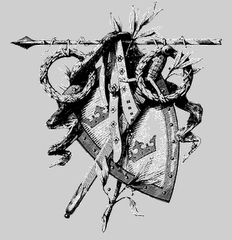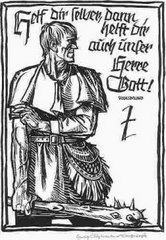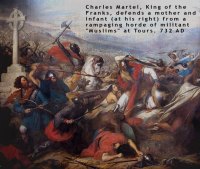 The White Man’s Burden by Rudyard Kipling:
The White Man’s Burden by Rudyard Kipling:
Take up the White Man’s burden, Send forth the best ye breed Go, bind your sons to exile To serve your captives’ need; To wait, in heavy harness, On fluttered folk and wild Your new-caught sullen peoples, Half devil and half child. Take up the White Man’s burden–In patience to abide, To veil the threat of terror And check the show of pride; By open speech and simple, An hundred times made plain, To seek another’s profit And work another’s gain. Take up the White Man’s burden–The savage wars of peace–Fill full the mouth of Famine, And bid the sickness cease; And when your goal is nearest (The end for others sought) Watch sloth and heathen folly Bring all your hope to nought. Take up the White Man’s burden–No iron rule of kings, But toil of serf and sweeper–The tale of common things. The ports ye shall not enter, The roads ye shall not tread, Go, make them with your living And mark them with your dead. Take up the White Man’s burden, And reap his old reward–The blame of those ye better The hate of those ye guard–The cry of hosts ye humour(Ah, slowly!) toward the light:–“Why brought ye us from bondage, Our loved Egyptian night?” Take up the White Man’s burden–Ye dare not stoop to less–Nor call too loud on FreedomTo cloak your weariness. By all ye will or whisper,By all ye leave or do, The silent sullen peoples Shall weigh your God and you. Take up the White Man’s burden! Have done with childish days–The lightly-proffered laurel, The easy ungrudged praise: Comes now, to search your manhood Through all the thankless years, Cold, edged with dear-bought wisdom, The judgment of your peers.
This burden as unique to the White Man is of early biblical description in the prophecy of Noah over his sons and the nations which they were to sire (Gen. 9 & 10). The blessing of Japheth (progenitor of the White tribes of the earth) has orthodoxically been regarded as pertaining to the later “grafting in” of the Gentiles. While this “enlargement” (Gen. 9:27) spoken of is specific to the Japhethite peoples it includes atleast a portion of Hamitic descendants in a “servant” status. But that is not to say that they must everywhere be subjugated, just that it be the providential decree of God concerning the innate dispositions of a given people, which, by definition, are not subject to human contravention.
Infact, we have in scripture the precipitous example of such a sense of responsibility gone awry at the Tower of Babel (Gen. 11) which expressed itself in the willful attempt to countermand the prophecy of their tripartite division of Humanity— establishing as it were, a “universal brotherhood of Man”. This is made clear by their collective declaration, “…let us make a name for ourselves, lest we be scattered abroad over the face of the whole earth.” (vs.4) They thereby made known their own intention to nullify Noah’s prophecy, the fruition of which they understood to be the division and social stratification of the families of Men. Rather than the divisive distinctions of Shemites, Hamites and Japhethites, they sought an undifferentiated oneness of Humanity. This remains today the exact approach of Humanism’s egalitarian Soteriology: If some families be uniquely blessed of God, simply assert that all are one family without distinction.
But to the consternation of contemporary social engineers, God still responds, “Indeed the people are one and they all have one language, and this is what they begin to do; now nothing that they propose to do will be withheld from them. Come, let Us go down and there confuse their language, that they may not understand one another’s speech” (Gen. 11:6-7). One of the well documented effects of cultural and racial amalgam is the rapid dilution of language. The less stable the ethnos, the less stable the linguistic moorings of a society. (Note the resilience of “Black dialects” in all White countries despite linguistic immersion amongst Whites. “Proper English” is achieved only among the most educated Blacks but even they tend to speak it with a certain sing-song rhythm which makes discernable inflections more illusive. Ethnographic and Morphological studies attribute such linguistic distinctions to breadth of sinus cavities in the skull, width of pallet, jaw shape, formation of lips, dexterity of tongue and language centers in the brain—which is to say that the reasons are manifold.) The less stable, the less cohesive. The less cohesive, the greater are social tensions. The greater the social tension, the more eminent is balkanization of common territories by all processes, including war. But currently the processes of division are tentatively limited to what’s known as “White Flight”, which, despite its harmlessness to others, is regarded as the very definition of evil.
But the issue of the White Man’s burden has always been a difficult one, especially for those of weaker conscience. It follows after the example of Luther, who said of his protection of kings that, “The greater blesses the lesser” (which he took from the exposition of Hebrews relative to the blessing of Abraham by Melchizedek who was a type of Christ). Aware as they were that with authority comes responsibility, European Colonialization was, as a matter of Christian conscience, self-scrutinizing. As in every human endeavor, there were abuses but as Thornwell echoed the American Puritans, “Shall the abuses of a few fathers justify the abolishment of the institution of family?” Despite incidents of injustice Colonialism was uniformly the best thing that ever happened to its Aboriginal populations around the world. Colonialism was only truly illegitimate to the extent that it was done in the pursuit of Empire rather than self-supportive Missionary endeavors or the lawful acquisition of land for White Christian Nations.
The nature of the White Man’s interaction with other peoples was still squarely at issue in the lead up to the War Between the States. The Lincoln/ Douglas debates highlight the historic divide: Douglas, speaking for the Confederate States, argued that Blacks were perfectly welcome and dearly loved amongst Southerners but that they were by the design of God, created in such a way that they could not reasonably nor biblically be considered equal to Whites in a White country. He maintained however, in the tradition of colonial Christian thought that the continued servant status of the Negro was of “mutual benefit” to both White and Black. Blacks were liberated from the harshest of existences in their homelands where they all toiled under the cannibalistic rule of heathen warlords. They were evangelized, taught trade skills, honor, civility, and those which displayed unique aptitude and sensitivities were adoringly appointed to administrative positions over the estates of their masters. The exceptional were regularly granted their freedom, went on to become masters themselves and were not begrudged for it, save by other Blacks. This hatred of the decent and capable is a mainstay of Black culture still.
Lincoln on the other hand, lying about the matter throughout the course of all seven debates reassured the American people that he had “no lawful right, nor intention of freeing the Nigger Race”. Once in office however, he proved Douglas’s suspicions correct, with his “Emancipation Proclamation”. He would later go on to tell a crowd of freedmen that they should be “returned to their native continent or some other location removed from Whites… in close proximity our peoples are nothing but a curse to one another.” (Despite the Liberian return, most Blacks wanted nothing to do with Africa) While this statement is shown true by way of the FBI’s Black on White crime statistics and the massive tax levies of Black-aimed social programs, it would not be so aside from their Emancipation which had put to an end the history of “mutual benefit”.
The concept of “mutual benefit” was born of the Christian theory of citizenship known as “Freehold Suffrage” (abandoned in the Freehold Suffrage debates of 1846). This was the view of the Puritans back of which lies the biblical definition of nationhood, “ethne” (nation, grk.), from whence we derive the word ethnicity as is further demonstrated by the template of Israelite citizenship throughout the Law and Prophets. That is, foreign peoples could be retained at various levels of social stratification inside our borders but could never be considered citizens of their host nation as they were not of the same “ethne”. They were of a different nation by definition.
Lincoln later resolved that it was logistically impossible to relocate the freed Blacks. Such a declension rang hollow even to his supporters. But it was for this grand leveling of society that Karl Marx would later tout Lincoln as his hero after whom he would pattern himself. In their correspondence Marx and the Lincoln administration referred to each other as “allies… friends of liberty… of a common cause”.
Max Boot writes: “In the early twentieth century, Americans talked of spreading Anglo-Saxon civilization and taking up the ‘white man’s burden’; today they talk of spreading democracy and defending human rights. Whatever you call it, this represents an idealistic impulse that has always been a big part in America’s impetus for going to war.”
The American Union, the Soviet Union, the later European Union and the coming Pan-American Union are all one and the same movement aimed at one-world governance under the United Nations. Its aim is the return to the state of oneness achieved in the shadow of Babel from whence God originally scattered them. It is the ongoing sinful preoccupation of the blessed families of the earth to save all others by declaring all to be an undifferentiated one. Much may be said of non-Whites’ desire to crucify their benefactors in the pursuit of self-salvation but so too is their much to be said of the White Man’s self-flagellating Christ complex. Both are in their different ways the bricks of our own tower which “reaches into the heavens”, a perpetual spire of blasphemy.
It must then be asked, if it has led us back down the same road that we trod descending the mountains of Ararat, what possible place does the White Man’s burden have for the Christian White man? Before we answer the question we do well to survey the appraisal of those whose station we’ve elevated so loftily:
The Black Man’s Burden
http://www.fordham.edu/halsall/mod/1903blackburden.html
The Brown Man’s Burden
http://www.guhsd.net/mcdowell/history/projects/wmburden/brownman.html
Though our presuppositions and affections devide us, oft muting our dialogue, these Aboriginal replies (written by White Men infected with the martyr-madness) to the White Man’s burden are discernable. They scream: “The better and more self-sacrificing you are, the more we will demand of you. Save us you White bastards!” We must realize that we cannot save them. Only God can do that. And we are not Him. We must allow them to take the stations commissioned them by their Creator. We must allow them to be “other” because they are not us. Let us live as Abraham did, by faith. By faith he sent Hagar and his beloved Ishmael into the wilderness as God commanded (Gen. 21: 10-14). He trusted that God was their true hope, not he.
Let us quit on this tower and return to “the boundaries of [our own] habitation” (Acts 17:26).





 "And the children of Israel did according to all that the LORD commanded Moses: so they pitched by their standards, and so they set forward, every one after their families, according to the house of their fathers." (Num.2:34)
"And the children of Israel did according to all that the LORD commanded Moses: so they pitched by their standards, and so they set forward, every one after their families, according to the house of their fathers." (Num.2:34)
 Though he cling to the Altar, the Apostate will find no refuge from God's Law.
Though he cling to the Altar, the Apostate will find no refuge from God's Law.
